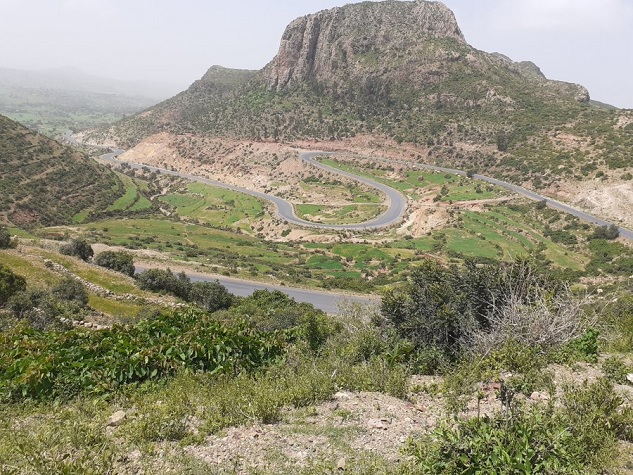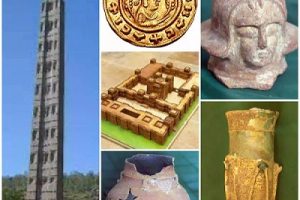
A few years ago, I was residing in Adwa and used to shuttle almost every day on the road stretching between Adwa and the ancient city of Axum. Starting from my primary school years, I knew Adwa is not just a name of a town in Tigray.
It is a name of a big victory day for Ethiopian patriots, a victory they scored against the Italian fascist invaders. But for the first few days of my days in Adwa, I had no idea about the historical significance of an impressive hill situated at a location about 10 minutes drive from Adwa town.
My curiosity about the scenic beauty of Mount Soloda led me to inquire into the place and I found out that it was also the scene of one of the greatest battles in African history, and a miraculous historic event of the 19th century.
An unprecedented event since the beginning of the European colonial expansion where black people defeated the civilized and well equipped European nation.
A writer who spent his childhood in Adwa district once wrote: “Soloda is a mountain that breezes history day and night: a history of freedom, sovereignty, courage, perseverance, unity in diversity, sacrifice for the motherland. You cannot help but be impressed by its breathtaking scenery and majestic views from every corner.
Its grace fills your heart and soul with a sense of pride, courage, and strength. That was the feeling me and my friends used to have when we climb Mount Soloda and wrote our names at the top of it.” Historians agree that the Battle of Adwa was one of the major events that happened near the end of the 19th century that decisively shaped 20th century Africa. Raymond Jonas, the author of The Battle of Adwa: African Victory in the Age of Empire, argues the impact of Adwa was even deeper than that.
In his book, he described Adwa as an event that turned the world on its head. Jonas says: “Adwa victory is a story of an exception. It opened another possible future for Africa. Adwa’s victory gave the lie to the very commonplace idea in the 19th century that Africa is going to be Europeanized in the fullness of the time.
The presses in America and Europe at that time were declaring it was only a matter of time before Africa will give way to European conquest and settlements. But Adwa’s victory shattered that illusion and hold out a possible alternative future.
Adwa also forced Europeans to rectify their misconception about Africa and Africa’s future.” Apart from the final decisive victory, the preparations for the war by itself showcase Ethiopian leaders’ extraordinary feat of maneuvering capabilities during those times when mechanization and communication technologies were in their primitive stages. One of the contributing factors of the Italians’ defeat was their misconception and underestimation of the capability of Ethiopians. The Italians were under the
wrong impression that Ethiopians were too diversified and divided to come together under one unified force resisting their military offensive. Ethiopians proved them wrong by establishing a well-structured huge army of peasants.
The Ethiopians of the Adwa days surprised the world by mobilizing to the war front on such a colossal scale from almost every corner of the nation. It must be underlined that Adwa’s victory did not happen by a stroke of luck. It is the outcome of Ethiopian leaders’ ingenuity and the patriotic sacrifice of about 20,000 patriots who paid the ultimate price and several thousand others that shed their blood and were wounded for the honor of their country.
The resounding victory of Adwa that echoed through generations to this has two major significances. First, the Adwa victory shattered the myth of white supremacy. It showed to the world that Europeans are not invincible, and thus marked the beginning of the end of colonialism.
The spread of the news of Adwa became an inspiration for people under colonial rule to rise and fight for their freedom. The second point of significance is Adwa forged a bond of solidarity among the black nations across the world.
It has become an eternal fountain of inspiration for the fighters for the causes of the continued struggle of the black race. The strengthening of the Ethiopianism religious movement, the rise of Marcus Garvey, the inception of the Rastafarian faith may be traced back to the Adwa victory. For black nations around the world, the word Ethiopia evoked the “promised land’ where blacks live as free and independent citizens.
After all, it was not a coincidence that the national flag of several African nations has a striking similarity with that of Ethiopia. The history of Adwa has inculcated Ethiopians with an unbreakable spirit of defiance against the influence and pressures of foreign powers.
On several occasions, the spirit of Adwa has galvanized Ethiopians into a strong united nation capable of achieving miraculous victories, despite differences in interests and outlooks. And this unity of purpose is as important today as much as in the Adwa days in the 19th century.
The Adwa victory has shown Ethiopians they can make wonders if they stand as a multiethnic unified force, but that without unity they would only make their country an easy prey for foreign adversaries. During the Adwa days, the Ethiopian leaders realized the critical importance of prioritizing nation to ethnicity.
From their epic victory at Adwa, Ethiopians have seen that national issues can and ought to be resolved by nurturing the shared values and aspirations of all citizens regardless of their ethnic and religious backgrounds.
Like in the Adwa days, the present generations of Ethiopian patriots have joined hands to score victories and maintain the sovereignty of their nation by successfully resisting the influence and threats of foreign powers.
With the spirit of Adwa, Ethiopians have recently defended a concerted attack on the sovereignty of the nation by internal traitors and foreign adversaries. Again with the spirit of Adwa, Ethiopians have astounded the world like it was the Adwa victory by generating power by using the River Abbay.
Those who understand the significance of Adwa victory are trying to study it indepth and write about Adwa.
They even have strived to make Adwa a global city by making it an African heritage site, and building a Pan African University in Adwa. At the same time, those, like TPLF, whose interpretation of Adwa is distorted by their narrow-minded ethnocentric vision, have ultimately made Adwa a scene of a continued cycle of war, destruction, and humanitarian crises. Had it not been for TPLF, much of the plans of making Adwa a center of PanAfricanism would have been translated into actions.
Adwa is a unifying force for the black nations. But it is sad to see Adwa in the hand of separatist terrorist rebels that imitate the outlooks and the deeds of the fascists Ethiopians defeated at Adwa 126 years ago.
A scholar recently commented if Ras Alula, Emperor Yohannes, Emperor Menelik were still alive to hear TPLF’s crazy idea of secession, they would have declared war to exterminate it. Adwa is a monumental African victory that came at a huge sacrifice of all Ethiopians.
It reminds the present generation of the huge price paid to build and preserve Ethiopia as we know it today with all its glory and reputation as a fountain of freedom for the black nations.
In a tribute to his relatives who gave their life at a young age to the glory of their motherland, an Ethiopian recently wrote: “ To my own great-great uncles who never made it home from the Battle of Adwa, who never got to be fathers, I am because you were.
In gratitude to all our forefathers’ sacrifices, I promise to do my part every day to leave a united free Ethiopia for the next generation.”
BY SOLOMON WASSIHUN
The Ethiopian Herald 3 March 2022





